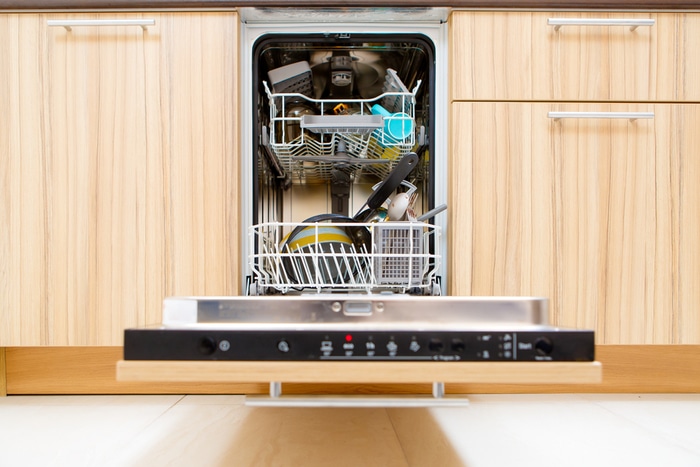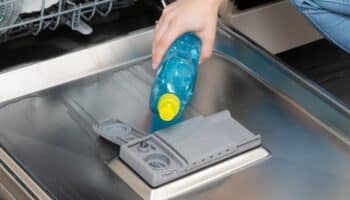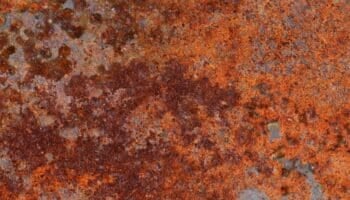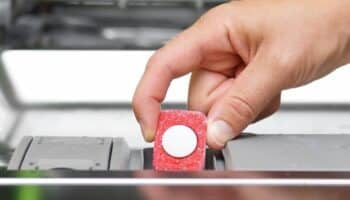We've independently reviewed this article to make sure it's as accurate as we can make it.
To find out more about our article creation and review process, check out our editorial guidelines.
Have ants turned the inside and back of your dishwasher into their favorite gathering spot?
You’re not alone! In fact, this is an issue that affects thousands of people all over the world on a daily basis. As of March 2023, about 52% of American households rely on automatic dishwashers, so if even 10% of those people share their dishwasher with ants, you know it’s a widespread situation.
But don’t worry, you came to the right place for answers. In this article, we’ll look at ways to get ants out of your dishwasher and living areas, so you can focus entirely on doing your dishes and nothing else.
But first, let’s answer the million-dollar question. Should you be concerned about ants in your dishwasher?
YES – and this is why:
- Ants live in large groups. You may only see a handful now, but wait a while; soon, you’ll be running an ant motel!
- As they scurry around, ants spread bacteria and contaminate food sources.
- Some ants release a nasty smell when stepped on or disturbed.
- Some ants can sting or bite. Allergic reactions are rare but can be very dangerous.
- A typical house ant, the pharaoh ant, has been linked to bronchial conditions and respiratory allergies.
- The wood-munching types of ants will destroy a home from the inside out, one bite at a time!
- Ants nest in your appliances because they’re nice warm spots, but they damage electronics – costing you money and causing stress.
- The Nuisance Factor – having ants all over your dishes in the dishwasher or scurrying up your legs is no fun.

WILL THE ANTS GO AWAY ON THEIR OWN?
NO. To rid yourself of ants long-term, you have to seal off their points of entry and remove their access to food and water sources.
We’ve put together a guide for you with easy ‘no more ants!’ solutions below:
How to Solve Ants In Your Dishwasher: 8 Causes & Solutions
There are many root causes and solutions that you can take a closer look at when there are ants in your dishwasher; some of them are:
♦ Food smells in the dishwasher → Pour at least 1 cup of vinegar down the dishwasher’s drain. The vinegar will mask food odors and sanitize the drain.
♦ Food particles building up in the dishwasher → After cleaning with vinegar, run the machine on an empty wash cycle. This cycle will remove dead ants and food build-up.
♦ Ants have a nest nearby → Lay down ant baits. The ants will take these back to the nest and poison the colony.
♦ Food and crumbs left out → Dishes left in the dishwasher and not washed immediately.
♦ Cracks or holes in the dishwasher → Get a sealant from your local hardware and seal holes in pipes, door seals, etc.
♦ Dishes left in the dishwasher and not washed immediately → Good hygiene around the dishwasher is a must. Put leftovers away immediately. Mix 1 cup distilled vinegar + 1 cup water for a cost-effective & antibacterial cleanser for wiping down kitchen surfaces.
♦ Ants coming from behind the dishwasher → Either wash dishes immediately OR, if leaving dirty dishes in the machine, shut the machine door tightly and ensure all cracks/holes in the plumbing are sealed off and kept in good repair.
Which Scents Do Ants Hate?
A little-known secret weapon in the war on ants in your dishwasher is SCENT. Ants communicate by pheromones – a type of scent they use to map a path to food and water sources. By covering these smells with something like a vinegar solution, we can break the communication chain so they don’t know where to go.
In my experience, essential oils are an easy way to eliminate ants while making your home smell amazing.
Here’s a list of scents to try:
- Pepper. Sprinkle cayenne or black pepper around your baseboards and behind your appliances to deter ants.
- Peppermint. Peppermint is offensive to many insects, so mix 10 – 20 drops of peppermint essential oil with 2 cups of water and spray the mixture around the windows and baseboards of your home. Let it dry in place to keep ants away.
- Tea tree oil. Mix 5 – 10 drops of tea tree oil with 2 cups of water and spray the problem and areas. Also, you can saturate cotton balls in tea tree oil and leave them where you’ve seen ants.
- Lemon eucalyptus oil is another natural insect repellent. Saturate cotton balls and leave them in ant-prone areas, changing them weekly. Note: Do not ingest lemon eucalyptus oil, and keep it out of reach of children and pets!
- Vinegar. Use undiluted vinegar or mix 50/50 with water. Wipe the areas where the ants are and let dry.
- Cinnamon leaf essential oil. Saturate cotton balls with the oil and place them in ant areas, or sprinkle powdered cinnamon for the same effect.
- Neem oil. Often used in Indian households, Neem oil is best used undiluted, i.e., at full strength. Wipe a thin layer around ant-prone areas.
- Coffee. Use brewed coffee grounds on a disposable item like a piece of cardboard, and place them near problematic ant areas. Change weekly to keep the coffee smell potent.
- Hand soap. The soap is readily available in most homes and removes the scent of ant pheromones. Use it on ant trails and around entry points in and around your home.
Getting Rid Of Ants Around Your Home
Besides being a nuisance, ants in your dishwasher and around the home can do significant damage, as we’ve covered so far. Here are some things you can try to get rid of them permanently:
AREA SOLUTION WHY IT WORKS
• Interior or exterior of the home ✓ D.E. kills insects like ants through dehydration. It’s safe for dogs/cats. • Exterior & Garden
• Exterior – place around ant nests * Liquid ant baits ✓ Taken back to the nest and queen ant, so kills all the ants at the source.
• Interior or exterior of the home * Ant sprays ✓ Form a barrier and disrupt ant trails into your home.
• Exterior & garden * Outdoor ant repellents ✓ Creates a barrier that ants won’t want to cross.
• Interior * Regular vacuuming ✓ Removes crumbs & food scraps that are attracting ants.
• Interior or exterior of the home * Sealing trash bins ✓ Removes the source of the ant’s Food.
• Kitchen * Diatomaceous Earth – Pest Control labeled, follow the package directions closely ✓ Eliminates food odors that attract ants.
• Exterior * Removal of vegetation close to the home. ✓ Stops ants building nests right on your doorstep.
How to Deal With Ants in Your Dishwasher Safely
In dealing with ants in your dishwasher, removing these tiny invaders is critical, but you should always keep your safety in mind. Here are some tips I recommend you consider:
- Choose the right product, and FOLLOW THE MANUFACTURER’S GUIDELINES closely.
- Ensure that kids, pets, and anyone nonessential to your pest control are out of the area while applying traps and poisons, and place these in areas where they won’t be a risk to anybody.
- When using poisonous or irritating substances, wear the appropriate protective gear – gloves, a face mask, etc.
- If the pesticide is in liquid form, you may be splashed, so wear long sleeves, long pants, and closed-toe shoes during application.
- Always mix pesticides outdoors or in well–ventilated areas.
- Mix only the amount you need – this means no leftover poison left lying around or having to be disposed of and forgotten.
- Be aware of the potential for a Pesticide Spill. Have absorbent things like paper towels or a bag of kitty litter on hand to soak up a spill safely.
- Remove personal items like keys, toys, laundry, etc., from the area to avoid contaminating them.
- When spraying pesticides outside, ensure there is no wind, and your doors and windows are closed.
- Even if you wore gloves, wash your hands and arms well after using any harmful substance.
Note: Many products for dealing with ants are dangerous/poisonous to humans. Please take a quick look at these pointers and stay safe!
Proactive Ant Defense – Prevent Ants Before They Appear
While the tips above should be very effective in dealing with ants in your dishwasher and around your home, it’s better to nip the situation in the bud before it even becomes something you have to address. To do this, I’d recommend you take a closer look at how you do certain things around your home and analyze whether there’s something you can change.
Here are some tips to get you started.
- Clean, clean, clean: Ants are attracted to fresh or rotten Food. Ants love crumbs, leftovers, and the occasional sweet treat in your cupboard. You should always do your best to keep your dishwasher and home clean. No crumbs = nothing for ants to enter your home for!
- Waste management: Like the previous point, ensuring your waste management game is on point is critical. Ants are okay with eating decaying meat, fruits, and vegetables, so don’t think that just because your bin smells terrible, they’ll be discouraged from exploring it. Try to throw out the garbage as often as possible and keep it in an airtight container to keep ants out and the bad smell in.
- Seal cracks and crevices: This also applies to other bugs and spiders, as those creepy crawlies love using the small hole in your home’s wall to make themselves unexpected visitors. Buying and applying a sealant to any cracks and crevices around your home will make it airtight, thus decreasing the chance of ants entering your living spaces.
Conclusion
That about sums it up!
When there’s an ant infestation in your dishwasher and all around your home, you might feel like you no longer own the place but are an unwelcome visitor instead.
Hopefully, this article has given you many tips and tricks for dealing with ants in the dishwasher and elsewhere. Please follow our safety precautions and enjoy ant–free living in your home!
If you found this article helpful, please check out our other resources below and consider subscribing to our newsletter. On the site, you’ll find various guides to everyday appliance topics, including a dishwasher buyer’s guide and a free calculator to estimate your machine’s power consumption.
Have a great ant-free day!
-Craig.







